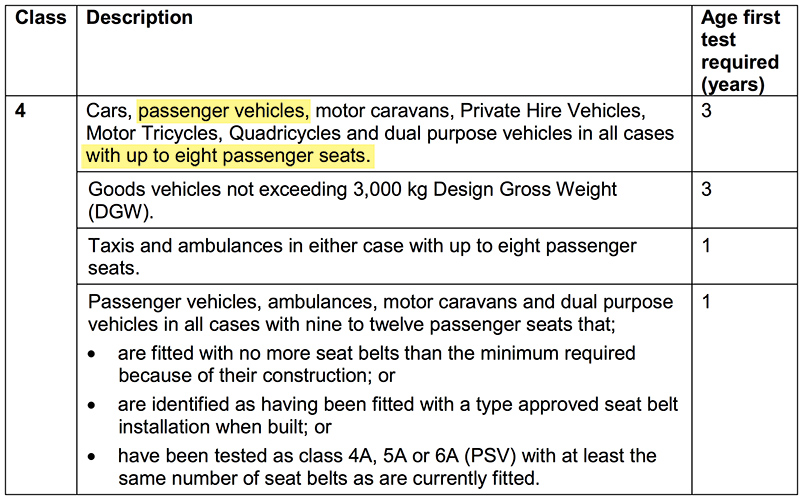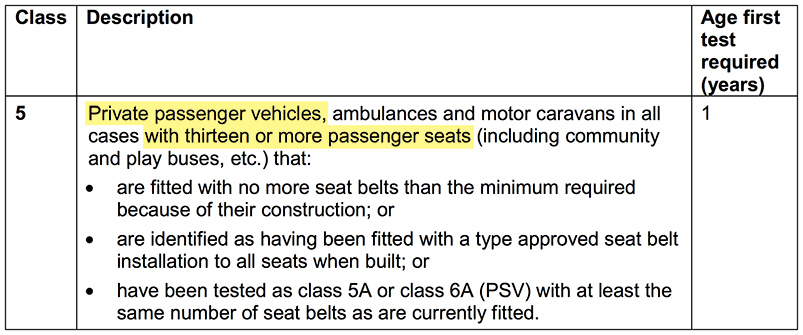You run the school… we’ll fix your bus
Operating your minibus requires a high level of safety reporting and unrivalled support from your chosen safety and maintenance supplier… look no further than CCM.
Check the links below to find out more, then call us to arrange a no-obligation visit from a member of our team.

A good maintenance and safety system
Let’s take a look at the key points of a good maintenance system. How will you score?
- Can you display that you carry out daily walk around checks for every day that your vehicle is used? Your driver or a responsible person must undertake a daily walk-around check, but the driver and employer remain ultimately liable.
- If you lease, hire or borrow vehicles then first use inspections must be conducted (especially important where vehicles or trailers have been off road).
- Your drivers report promptly any defects in writing.
- Records of checks and rectification reports must be kept for at least 15 months.
- Operators must contractually appoint a safety inspection supplier and ensure that safety inspections are conducted at the correct frequency (10 weeks or 6 weeks).
- Your safety inspections must include all items covered by the annual MOT test.
- Your safety inspections should be pre-planned, ideally 6 months in advance.
- Your system of safety inspections must be monitored.
- Each of your safety inspections must include: name of owner/operator, date of inspection, vehicle identity (registration mark/trailer number), make and model, mileage reading, a list of all the items inspected, details of defects, name of inspector, signed declaration that any defects are repaired and vehicle is road worthy
- All repair work must be carried out by a qualified supplier and must be recorded/documented.
- Your safety inspection records must be kept for at least 15 months.
- Staff carrying out safety inspections must be competent to conduct these checks, typically a qualified MOT tester.
- You must have a documented system for taking vehicles off the road.
- Your safety inspections must be conducted with appropriate tools and facilities.
- Safety inspection suppliers must have access to a means of measuring brake efficiency and setting headlamp aim, and to assess diesel smoke readings.
- You are responsible for the condition of all vehicles and any trailers used.
- You must have a formal written contract with your inspection garage.
- You must be able to prove forward bookings for all safety inspections.
- Your maintenance (or servicing) scheduling system should be used to identify inspection dates at least six months in advance.
- Your drivers must be adequately trained and given clear written instructions about their responsibilities (CCM can train your staff for this task).
Book your safety check with CCM today
6 or 10 Weekly Checks
- Regular, or routine safety checks are an essential part of maintaining your vehicles and maintaining the validity of your insurance cover.
- Safety checks should not be confused with mechanical servicing schedules, which should be observed to intensity of use and manufacturers guidelines.
- 6 or 10 weekly checks should be conducted by a competent contractors, typically a suitably qualified garage with appropriate equipment along with DVSA MOT testing facilities.
- Regular safety checks are paramount in the avoidance of sudden component failure and for minimal vehicle downtime.
- ‘First Use’ inspections typically follow a similar format to the scheduled safety checks and should be used on hire vehicles and new or temporary additions to your fleet.
- Your scheduled safety check should include all the elements of the annual MOT test, as such is typically best conducted by an authorised mot tester (CCM has 12 of these).
- Vehicles 12 years and older must have the check period reduced to 6 weekly.
- You must retain all regular safety check and daily check records for 15 months. CCM can retain all regular safety check records for you to request on demand.
- Your organisation must have an appointed responsible transport manager who can decide when vehicles can be returned to fleet following defect identification and repair, or you can delegate the return to fleet responsibility to your chosen contractor.
- Your driver and our staff become responsible for the vehicle safety of your fleet and as such, each should be individually informed in writing of their specific duties and confirmation of this acceptance should be retained.
- You should not undertake regular safety checks unless you have appropriate facilities.
- Each regular scheduled check should include a roller brake test and emissions test – if you are using a contractor that cannot supply this then you are using the wrong contractor!
- It is essential to retain a written contract with your safety check supplier, and conduct annual review to ensure contract meets needs.
- Your checks and maintenance should be planned in advance at least 6 months at a time, and schedules should allow for MOT and service to be conducted at a coincidental time to ensure best efficiency and reduced downtime.
Book your safety check with CCM today

Fixed Price Schedules
At CCM we understand that you need to keep financial controls around your vehicle costs. That’s why we offer fixed prices for all routine and scheduled work, with account facilities for schools, colleges, councils, businesses and charities.
Our team will work with you to identify the correct schedules for each vehicle and pre-agree a work package and price levels.
For unforeseen works, we will agree on an auto authority budget that allows us to safely maintain your vehicle, with fast turnaround repair processes and limited vehicle downtime.
What the DVSA Say
At CCM we are often asked if we are authorised to test minibuses. Well, we are glad to say yes.
Whilst there is some confusion about the need for PSV driver licences, the guidance from DVSA is actually very clear when it comes to the MOT test for these vehicles. Duly, during a recent training session, we asked our local DVSA Regional Manager if he could clarify, he directed us to the test class information contained within the MOT Testing Guide.
First, let us look at a passenger carrying vehicle with 9 – 12 seats, these are classified as Class 4 for MOT testing Purposes.

Now let’s look at the more common larger minibus, with 13 or more passenger seats, which are classed as Class 5 for MOT testing purposes.

CCM operates two Class 5 MOT testing sites based at our Cranleigh and Gatwick depots.
At these sites, we can offer MOT testing, all service and repair and routine checks with full backup and support, coupled with fast turnaround times.
Our Head Office site in Ewhurst also caters for repair and safety checks.
